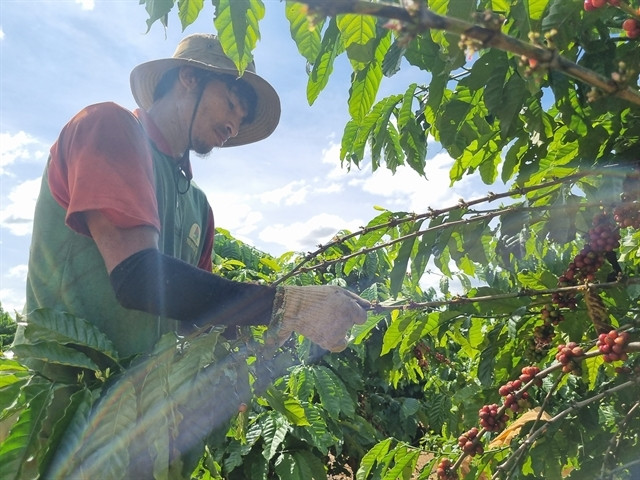 |
| A farmer works on his coffee farm in Gia Lai Province. Coffee is one of the three industries in Việt Nam most affected by the EUDR regulations besides wood and rubber. — VNA/VNS Photo Hồng Điệp |
Some Vietnamese enterprises have rushed to plan their planting areas to comply with the requirements of the EU Deforestation Regulation (EUDR) in order to conquer the strict EU market.
The Hà Nội-based Kim Thông trade, service and tourism cooperative said it has chosen raw materials grown entirely on agricultural land to comply with the EUDR regulations. The company aims to export mountain peanut, sacha inchi, made products to some European markets including Germany.
Chairwoman of the cooperative Đỗ Thị Kim Thông told doanhnghiepvn.vn that her cooperative grows sacha inchi trees on agricultural land in Hòa Bình, Lai Châu and Sơn La provinces, instead of on forest land.
Similarly, the GGTD Joint Stock Company said with the EUDR regulations, in the long term, planning raw material areas is an issue that domestic enterprises should pay attention to.
The company's deputy general director Hạ Quyên told the online newspaper that her firm has been focusing on planning raw material areas in the Central Highlands provinces and some localities in the North such as Hải Dương and Hưng Yên, to meet the requirements of EU markets.
However, many enterprises have failed to fully understand the EUDR requirements. These enterprises have petitioned the State management agencies to organise more training programmes to help them better understand the specific requirements of the EUDR, thereby preparing appropriate production plans and supply chains.
According to Hoàng Thành, Programme Officer at the EU delegation to Việt Nam, to deal with the challenges from the EUDR, Việt Nam needs to have an action plan framework to adapt to.
He said that top priority should be given to establishing a public-private alliance to exchange information and secure data and building a forest and production system that meets the EUDR. Training programmes on the EUDR and technical solutions to support businesses in complying with EU regulations should also be included.
The EUDR, which came into force on June 29, 2023, mandates that products placed on or exported from the EU market must be traceable, deforestation-free and legally produced. Larger companies importing these commodities into the EU must comply by December 30, 2024, while small and medium-sized enterprises must comply by June 30, 2025.
Trần Quang Bảo, director of the Forestry Department under the Ministry of Agriculture and Rural Development said wood, coffee and rubber industries are the three industries in Việt Nam most affected by the EUDR regulations.
"Thanks to the assistance of domestic and international partners, those three commodity groups have made preparations for EUDR. Along with that, we have specific action plans for every commodity, which are managed by the ministry," he told Việt Nam News.
"We are still waiting for official regulations. but based on discussions at seminars and draft documents, sectors have done trial research and built data on coffee and forestry to get ready for the regulations."
Bảo said the EUDR implementation is a chance for Việt Nam to affirm the legality and sustainable values of Vietnamese exported products to the EU.
The EU is a large and important market for Vietnamese farming produce and other goods. In 2023, Việt Nam exported over US$53 billion worth of products to the bloc, with key items including coffee, rubber and wood.
Trade experts believed that Việt Nam's export turnover to the EU could significantly increase if Vietnamese enterprises could better comply with the EUDR regulations. — VNS